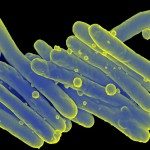Lien vers Pubmed [PMID] – 25703550
Immunol. Rev. 2015 Mar;264(1):25-45
Mycobacterium tuberculosis has evolved from a Mycobacterium canettii-like progenitor pool into one of the most successful and widespread human pathogens. The pathogenicity of M. tuberculosis is linked to its ability to secrete/export/release selected mycobacterial proteins, and it is also established that active release of mycobacterial antigens is a prerequisite for strong immune recognition. Recent research has enabled mycobacterial secretion systems and vesicle-based release of mycobacterial antigens to be elucidated, which together with host-related specificities constitute key variables that determine the outcome of infection. Here, we discuss recently discovered, novel aspects on the nature and the regulation of antigen release of the tuberculosis agent with particular emphasis on the biological characterization of mycobacteria-specific ESX/type VII secretion systems and their secreted proteins, belonging to the Esx, PE, and PPE categories. The importance of specific mycobacterial antigen release is probably best exemplified by the striking differences observed between the cellular events during infection with the ESX-1-deficient, attenuated Mycobacterium bovis BCG compared to the virulent M. tuberculosis, which are clearly important for design of more specific diagnostics and more efficient vaccines.


